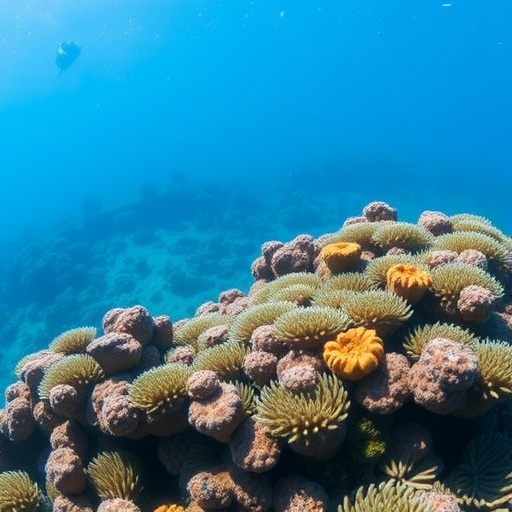Coral Preservation Takes a Leap: How Grazing Deterrents Could Change the Face of Reef Restoration
Coral reefs, often deemed the rainforests of the sea, do more than just captivate with their vibrant colors and diverse ecosystems; they represent a critical aspect of marine biodiversity. These ecological hotspots provide essential services not only to marine organisms but also to human populations. As climate change progresses and human interference intensifies, threats to coral reefs also escalate, primarily through coral bleaching, ocean acidification, and herbivorous fish grazing. Recent research published in Coral Reefs by van der Steeg et al. offers new insights into an innovative approach to bolster coral survival through the use of grazing deterrents.
In this seminal study, the researchers meticulously examine how the introduction of non-toxic grazing deterrents can enhance the survival rates of outplanted juvenile corals. With global coral populations in precarious decline, the urgency becomes paramount; innovative solutions must be prioritized. The use of grazing deterrents, substances that deter herbivorous fish from snacking on young corals, could mitigate a significant threat that leads to high mortality rates among outplanted coral juveniles.
The study by van der Steeg and the team employs rigorous field experiments to assess the effectiveness of various grazing deterrents. Their findings reveal that these deterrents not only shield juvenile corals from predation but also enhance their resilience in fluctuating marine environments. By protecting these corals during critical early growth stages, the chances of survival dramatically improve, leading to more robust reef restoration efforts.
A noteworthy aspect of the research is its application in real-world reef restoration projects. As marine biologists attempt to restore degraded reefs, understanding juvenile coral dynamics becomes crucial. The deterrents examined in this study provide both a preventive measure and a means to encourage more successful outcomes in replanting initiatives. The results speak volumes; implementing grazing deterrents could lead to a significant uptick in the efficacy of coral reforestation programs, helping to restore ecosystems that have been battered by environmental stressors.
Furthermore, the study highlights the ecological interplay between juvenile corals and their herbivorous predators. By analyzing this relationship, the researchers delineate how grazing impacts survival rates and growth patterns. The data compiled demonstrates an alarming correlation between overgrazing and decreased juvenile coral health, indicating an urgent need for intervention strategies like those outlined in the research.
Despite initial findings suggesting the efficacy of grazing deterrents, future research is necessary to assess the long-term impacts of these products on the broader ecosystem. The potential ramifications of disrupting natural grazing patterns must be scrutinized to ensure a balanced approach to coral restoration. The authors raise poignant questions regarding the sustainability of utilizing such deterrents in restored marine ecosystems, advising that ongoing monitoring will be essential.
In addition to their immediate benefits, grazing deterrents could serve as a critical tool for enhancing the resilience of coral reefs to climate change. By improving juvenile coral survival, these substances might indirectly aid in the stabilization of coral populations that are crucial for maintaining biodiversity and marine health. Such enhancements could also foster greater adaptability in succumbing to the stresses imposed by climate change, potentially allowing coral reefs to thrive in more marginal environments.
This groundbreaking research lays the groundwork for a new chapter in coral conservation, marrying ecological science with practical restoration strategies. The implications extend beyond academic circles; stakeholders, including policymakers and conservationists, can glean valuable insights from the findings. The strategies for using grazing deterrents can be incrementally adopted into existing restoration frameworks, enhancing their overall success rates.
Moreover, the authors call for collaboration across various sectors — from academia to community-based organizations — in order to implement these findings effectively. For instance, local fishery management practices could be revised to accommodate these new strategies, fostering a holistic approach to marine ecosystem health. By incorporating dual objectives of maintaining local fish populations while encouraging coral preservation, a balanced ecosystem could be attained.
Ultimately, the research conducted by van der Steeg et al. shines a light on innovative methods that could redefine how we approach coral restoration. With coral reefs facing unprecedented challenges, the results hold significant promise for harnessing the resilience of juvenile corals through practical applications in the field. Such a pragmatic approach not only affirms the role of science in environmental advocacy but serves as a clarion call to action for reef conservation efforts globally.
In the face of looming ecological crises, this study encapsulates a blend of optimism and urgency. As the narrative of coral reefs continues to evolve, the integration of grazing deterrents represents a vital stepping stone toward rejuvenating these precious ecosystems and ensuring their survival for generations to come. Given the fragility of marine ecosystems, proactive measures in coral conservation must take center stage, guiding research and policy in a direction that acknowledges the interconnectedness of marine life and ecological health.
As the coral conservation community watches closely, the ongoing discussions and analyses stemming from this groundbreaking study will influence future research agendas. In a world where ecological resilience is more critical than ever, the lessons from this research provide hope and a roadmap for successful coral reef restoration, marrying innovative science with the pressing needs of our planet’s most vulnerable ecosystems.
Subject of Research: Coral Reeefs and Grazing Deterrents
Article Title: Grazing deterrents improve survival of outplanted juvenile corals.
Article References:
van der Steeg, E., Humanes, A., Bythell, J.C. et al. Grazing deterrents improve survival of outplanted juvenile corals. Coral Reefs 44, 1389–1401 (2025). https://doi.org/10.1007/s00338-025-02703-z
Image Credits: AI Generated
DOI: https://doi.org/10.1007/s00338-025-02703-z
Keywords: Coral reefs, Grazing deterrents, Coral survival, Marine ecosystems, Reef restoration, Juvenile corals, Ecological health, Environmental science.




